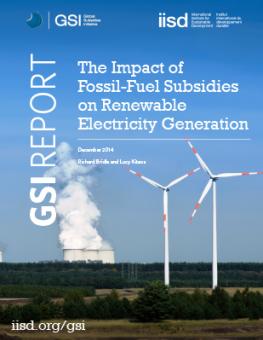
The Impact of Fossil-Fuel Subsidies on Renewable Electricity Generation
Fossil-fuel subsidies are prevalent in many countries.
The International Energy Agency (IEA) has estimated that consumer subsidies to fossil fuels amounted to US$548 billion in 2013. In the same year, subsidies to renewable energy were estimated at US$121 billion. However, a comparison of numbers does not reveal the extent to which renewable energy is being disadvantaged in favour of continued reliance on fossil-fuel generation. The high level of fossil-fuel subsidies certainly creates disadvantages for renewable energy, but to understand the true impact it is necessary to explore the range of subsidy mechanisms rather than focus simply on the magnitude of the cost of subsidies.
In this paper the Global Subsidies Initiative presents a more complete examination of how fossil-fuel subsidies can impact the deployment of renewable energy. The paper discusses the effect of fossil-fuel subsidies on the cost competiveness of renewables, the incumbent advantage of fossil-fuel-powered generators and the distortion of investment decisions.
Participating experts
You might also be interested in
Fossil Fuel Subsidy Reform in Aviation and Shipping
Countries can address fossil fuel subsidies in aviation and shipping by changing legislation to allow for reform and introducing emission levies.
Federal Legislative Authority in Relation to Oil and Gas Development in Canada
This report outlines federal legislative authority related to oil and gas development in Canada.
Five Key Priorities to End Fossil Fuel Subsidies in Canada
As the G7 president in 2025, Canada has a pivotal opportunity to lead by fully phasing out fossil fuel supports and investing in a cleaner, more equitable future. Here are five recommendations for effective subsidy reform.
The Cost of Fossil Fuel Reliance
Government support for fossil fuels reached at least USD 1.5 trillion in 2023, new data shows.